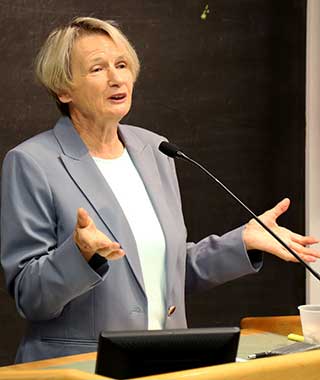
Mari Fitzduff, professor emerita of the Master of Arts in Conflict Resolution and Coexistence (COEX) program, has generously donated her Brandeis University retirement fund to create a 10-year fellowship program. Named “The Fitzduff Family Fellowship,” the scholarship will be awarded each year to an international COEX student from a war zone, allowing the recipient to gain skills from the Heller School that will allow them to return and build peace in their home community.
Fitzduff, who retired from the Heller School in May 2019, is an expert in the peacebuilding process and the social psychology of inter-societal conflict. In her retirement, she is continuing her practice and working on an upcoming book focused on behavioral peacebuilding for civilian and military personnel working in conflict areas.
Why set up a fellowship fund? She says, “Both my husband and I have concerns about inherited wealth … both the taking and the giving of it. How can you work in Heller and not have them? We have two sons and a daughter-in-law who are all professionals and lack none of the necessities of life, nor do their children. We live relatively simply, and so have ended up with more funds than we thought we needed for the next stage of our lives.”
Additionally, as the founding director of the COEX program, Fitzduff is proud of the program and the work that her many students are doing around the world today as alumni. “But it is very hard for many of our students to find funding for the work. Many of them come from situations where they and their families and friends are struggling to get by … in the midst of sometimes terrible wars. If by funding a tuition scholarship we can help one more person come to our program, then we are very happy to do this.”
Fitzduff herself is familiar with this struggle, as she began her career in her home of Northern Ireland during the 1990s, where she was deeply involved in facilitating peace. She notes that “a very important part of this work was the building up of trusted institutions, even in the middle of the war, that could address issues of inequality, housing, public services, etc., and thereby make political agreements more possible.”
To that end, Fitzduff has always felt that the COEX program is well situated in a school of social policy, like Heller, where students often go on to careers that help ensure more inclusive and peaceful societies.
